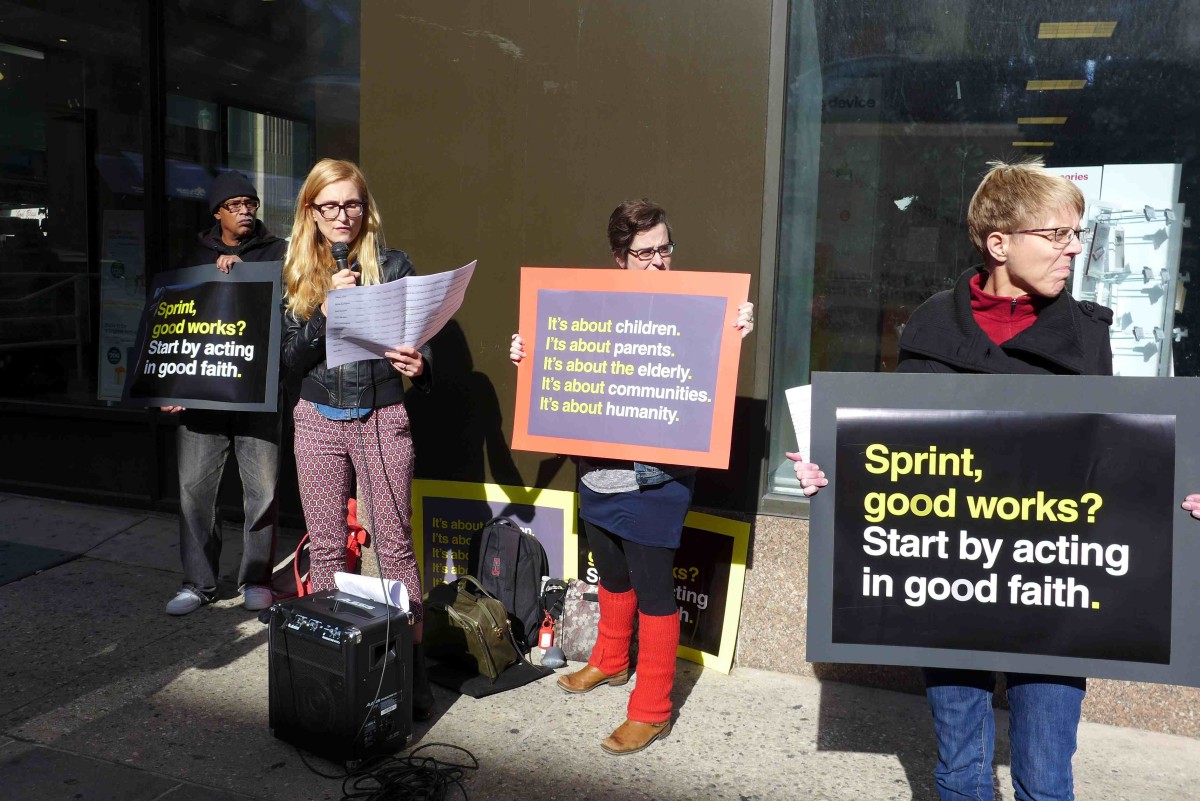Paul Rossetti lives in publicly-funded transitional housing. The $14.95 he pays for internet is the only way he can afford the service. He’s an individual not covered by Comcast’s low-cost Internet Essentials program, because he neither qualifies as elderly nor has school-age children.
His testimony was one of many in the small protest organized by Mobile Citizen, Mobile Beacon and Media Mobilizing Project at 13th and Chestnut in front of a Sprint store Tuesday afternoon to protest the company’s new broadband internet changes. About 10 people were part of the protest.
To the busy lunch crowd Hannah Sassaman, from West Philly advocacy group Media Mobilizing Project, read a flood of testimony from Mobile Beacon’s Change.org petition, signed by more than 5,500 people.
The comments were from mothers of disabled children who can’t otherwise afford internet access. Those with medical needs who need the internet to contact their physician. And schools that use Mobile Beacon and Mobile Citizen’s services for their security system.
The event was organized by Mobile Beacon and Mobile Citizen, two nationwide nonprofit service providers that rely on Sprint’s former WiMAX network to deliver cheap broadband internet access to schools, churches and community groups. The service is called CLEAR.
As covered earlier in Technical.ly, Sprint plans to shutter its WiMAX broadband network, which could leave some 10,000 at-risk Philadelphians in a lurch since Sprint and Mobile Beacon and Mobile Citizen have yet to come to a contract agreement.
CLEAR reaches at-risk populations not covered by comparable programs, like Internet Essentials, which requires customers to have a child in a school that’s eligible for reduced or free lunch. (The CLEAR shutdown happens as the City of Philadelphia nears the end of its 15-year franchise renewal negotiation with Comcast.)
Mobile Beacon and Mobile Citizen organized the protest to ensure that pressure is kept on Sprint as the company continues negotiations with the nonprofits. It was also an effort to increase public awareness on digital accessibility issues, advocates from the nonprofits said.
The nonprofit service providers bought some time last week as a Massachusetts judge ordered an injunction on Sprint’s plan to completely shutter its WiMAX network on Nov. 6. They now have a little under three months to move their customers over to Sprint’s 4G LTE network.
Last week, Sprint attempted to order a $65 million bond from the nonprofits to cover the costs of running the WiMAX network for 90 more days, but a state court rejected the motion.
“The court order is clear in what’s to be expected of Sprint,” says Katherine Messier, managing director of Mobile Beacon.
Mobile Citizen spokeswoman, Kristen Perry says that Rossetti, the man who lives in publicly-funded housing, is in the precise community that is most affected by Sprint’s policy change.
“There are many programs bridging the divide, but the need is still not met,” Perry said. “By serving those institutions that aren’t provided full service, Mobile Citizen and Mobile Beacon are filling that gap.”
When reached for comment, Sprint spokeswoman Marci VerBrugge-Rhind wrote in an email: “For at least a year and a half, Sprint has been working with Mobile Citizen and Mobile Beacon to ensure they can transition their customers to the higher quality LTE network. We look forward to Mobile Citizen and Mobile Beacon working with Sprint in good faith to get their customers transitioned so that they can remain connected.”
She added: “Ultimately this is a contract dispute and we hope they will work cooperatively with us to resolve it. Sprint’s record of programs to bridge the digital divide proves it cares about ensuring as many customers as possible are connected at all times. In fact, we’ve been a leader in providing internet connectivity for many years through digital access programs like ConnectED and ConnectHome, and through grants provided by Sprint Project Connect.”
Other action by Mobile Citizen and Mobile Beacon included a protest in Kansas City last week that concluded with members attempting to turn over the 5,000-signature petition to Sprint’s headquarters in that city.
Before you go...
Please consider supporting Technical.ly to keep our independent journalism strong. Unlike most business-focused media outlets, we don’t have a paywall. Instead, we count on your personal and organizational support.
3 ways to support our work:- Contribute to the Journalism Fund. Charitable giving ensures our information remains free and accessible for residents to discover workforce programs and entrepreneurship pathways. This includes philanthropic grants and individual tax-deductible donations from readers like you.
- Use our Preferred Partners. Our directory of vetted providers offers high-quality recommendations for services our readers need, and each referral supports our journalism.
- Use our services. If you need entrepreneurs and tech leaders to buy your services, are seeking technologists to hire or want more professionals to know about your ecosystem, Technical.ly has the biggest and most engaged audience in the mid-Atlantic. We help companies tell their stories and answer big questions to meet and serve our community.
Join our growing Slack community
Join 5,000 tech professionals and entrepreneurs in our community Slack today!

The person charged in the UnitedHealthcare CEO shooting had a ton of tech connections

From rejection to innovation: How I built a tool to beat AI hiring algorithms at their own game

Where are the country’s most vibrant tech and startup communities?


